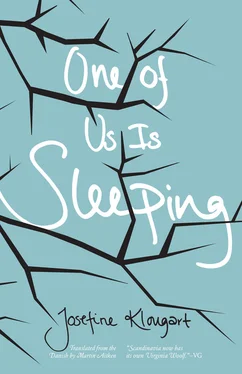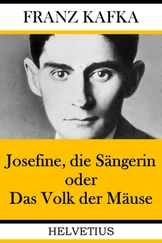And then.
Where did you go.
She, who still sits on the floor under the sink, unlocks the door and lets him come in, and he falls around her like a loose dress whose shoulder straps someone sliced with a knife.
SHE REMEMBERS SHE was drinking that night. After she asked him to go. Are you sure you don’t want me to stay. I’m sure, just go. She remembers knocking back one glass after another. As alone as could be, but nothing was the way one could imagine it to be: right . Nothing real. Or — too real by half. She wasn’t quite grieving, but pretending. She was drinking, that’s all. Because a person can do that. And because sorrow kept being postponed. By what. Canceled. By this feeling of nothing being real.
I’m not going to leave you, he’d said, more than once.
He was that ignorant, so it seems.
That young.
I’m just telling you like it is, that’s all, he said, and then ran that eternal hand through his eternal hair. He kept revealing himself to be unhappy. Completely unsuited for life.
You leave people all the time.
You leave reality all the time.
She was angry, as if because of some unjust sentence, a match unfairly refereed, unfair weather and unfair fatigue.
The sun dangling from a thread.
Reality, riddled with sentences like:
I won’t leave you.
It’s not too late.
You never know what can happen. And yet we know all too well. We’ve known all along.
Can you remember when we met, he asked her later.
No, I can’t. Can you.
Yes, he replied.
I don’t think so. I think you can remember when we split up. It happened at the same time.
There is a sense of an approach in reverse. A body running backward. A mouth eating a piece of white bread into existence on an empty plate, drinking red wine until the glass is filled, raking chestnuts back across the floor, pearls, an inverse explosion; stripes on a candy stick appearing under the tongue. Collapsing, like a cake in the oven, one’s thoughts, scaffolders falling like rain outside windows. That kind of disaster. That isn’t insurmountable, as you always say. It all happened so quickly, we buried him. And the car, you should have seen the car afterward.
Unreal.
But it’s not lack of reality that this is all about. It’s just the world, when it gets too real. Like me, she thinks; maybe I was just too real for you.
You’ve been chewing your lip. Stop it.
Only he’s the one who chewed his lip. That kind of mix-up.
It’s spring already, summer already, autumn already, and winter has just begun. He has just begun; you have. She goes home and thinks about a child that never was. Herself, perhaps.
She is displaced in time, always.
HE SEES HER to the train and tells her about a film he saw. She thinks to herself his time will soon be short, she counts on the fingers of her hand, how many years, six years older than she, and for a moment she has no idea how old she is herself, but he is twenty-eight, that must be right. You think about children, you dream about children in the night and dream about them in the day. She knows he is thinking the plan is falling apart. And then he tells her about this Bergman film in which a young woman discovers that for a time in her childhood she hated her mother.
Autumn Sonata.
Only there was no place for that kind of emotion, he says. She looks at him, the lines around his eyes.
He throws up his hand. There just wasn’t room, not at that time. And later, he goes on with enthusiasm, the young woman kind of works it out. Realizes that the fear she feels all the time stems from this kind of — pent-up hatred.
She smiles. So now, she says, you think I should let myself hate my mother.
Yes.
She smiles. He smiles.
But that’s not what I’m saying, he says. It’s just something I’ve been thinking about.
I think it’s the same for all of us. All Bergman’s films are made for us all.
Maybe you’re right, he says. Are you looking forward to going home to Mols.
She thinks for a moment. I’m looking forward to seeing if I can . If I can be there. I can’t really be anywhere else.
I think it’ll be a release for you, he says then. To get away from the city for a while. From that man of yours.
She nods. Perhaps. She kisses him suddenly on the mouth. Just so you won’t forget me, she thinks. Hey, he says, and smiles. Hey, she says. I didn’t mean it, she lies.
But then it was him kissing her, holding her tight. And then her turn to say hey, and he who lied himself to a kind of repentance.
Nothing is more or less real.
A particular kind of light she remembers from her childhood. A realer light, that makes everything look more real while it’s there, and then afterward, when you think back: more unreal .
Are you coming with me, she asks him.
No, he says without hesitation.
Only she’s the one saying no, and he asking if he can come with her. There’s no answer.
No, is the question. No, are you coming with me. Are you coming with me, no.
She is a hunger artist, and only a single ticket sold. Her audience of one has fallen asleep. A balloon tethered to his wrist by a string, floating three meters in the air above. Inside a tent of busy stripes.
There is no solution to the riddle.
Look at me, he says, taking her hand. A month is nothing, you’ll finally have peace to write. Or maybe he doesn’t take her hand at all.
Peace and quiet.
Peace and quiet.
I THINK I am a person who sees everything that almost exists. It’s a way of remaining unhappy, incapable in every respect. To see, not what is , but what could be . That which is coming, but which never comes, that chronic postponement, things imminent, likely soon, just around the corner, etc. Only sometimes it turns out that what lies ahead does not exist, there was nothing there, and I am someone else. Almost is the same as not , at worst never . Non-births, undesires, the impossibility of something like circumstances. In any other circumstance —it doesn’t bear thinking about. I am a guest on her way home, reeling away from a party that never was. How come this intoxication, this hangover, these pangs of regret, when there wasn’t even a party. Non-places. Whatever they are. It all starts and ends in an idea you eventually have to swallow. All your ideas and good intentions, that patience, that ability to convince the eye to see: invisible. And to be, fundamentally, seen — an invisible person in the world. To another, who cannot see you, cannot see me. Because he keeps disappearing anyway. Because he can’t find the right distance: close. Because maybe he can’t.
There are people who cannot love you. And it has nothing to do with wanting. It has nothing to do with desire. It becomes a matter of economics — negotiation. Columns, lists of one thing and another. A contract of service. Salary. Or no salary, voluntary work, driven by expectation and pictures of things to come. Like negatives, I see everything as though in negative, everything dark is light, and what’s light vanishes into black. But you think you see a person. A resemblance. I see the outline.
But then it’s not a person I see at all, not a person I expect. Who am I coming home to, who will be in my bed. A person in reverse, a person who cannot . Incapable. Incapable in love. And it has nothing to do with justice or ill will or the best of intentions. Love can be an economic specter, riding you through a series of images that never develop. Into anything. Other than images, an exquisite dream by which to sleep; from which to awaken bruised; what are you complaining about; you’re almost there, at the finish line. And the excuses you’re given along the way. Bait fed to you by corrupt animal keepers.
Читать дальше












